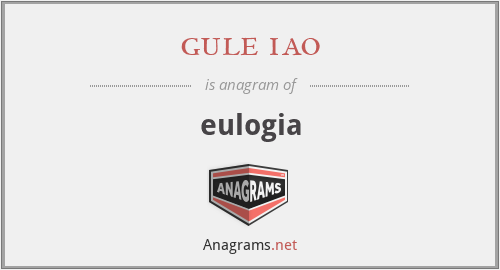What anagrams are available for eulogia?
This page is about an anagram for the word gule iao that can be used in word games, puzzles, trivia and other crossword based board games.
gule iao
Translation
Find a translation for gule iao in other languages:
Select another language:
- - Select -
- 简体中文 (Chinese - Simplified)
- 繁體中文 (Chinese - Traditional)
- Español (Spanish)
- Esperanto (Esperanto)
- 日本語 (Japanese)
- Português (Portuguese)
- Deutsch (German)
- العربية (Arabic)
- Français (French)
- Русский (Russian)
- ಕನ್ನಡ (Kannada)
- 한국어 (Korean)
- עברית (Hebrew)
- Gaeilge (Irish)
- Українська (Ukrainian)
- اردو (Urdu)
- Magyar (Hungarian)
- मानक हिन्दी (Hindi)
- Indonesia (Indonesian)
- Italiano (Italian)
- தமிழ் (Tamil)
- Türkçe (Turkish)
- తెలుగు (Telugu)
- ภาษาไทย (Thai)
- Tiếng Việt (Vietnamese)
- Čeština (Czech)
- Polski (Polish)
- Bahasa Indonesia (Indonesian)
- Românește (Romanian)
- Nederlands (Dutch)
- Ελληνικά (Greek)
- Latinum (Latin)
- Svenska (Swedish)
- Dansk (Danish)
- Suomi (Finnish)
- فارسی (Persian)
- ייִדיש (Yiddish)
- հայերեն (Armenian)
- Norsk (Norwegian)
- English (English)
Definition
What does eulogia mean?
- Eulogia
- The term eulogia (Ancient Greek: εὐλογία, eulogía), Greek for "a blessing", has been applied in ecclesiastical usage to "a blessed object". It was occasionally used in early times to signify the Holy Eucharist, and in this sense is especially frequent in the writings of St. Cyril of Alexandria. The origin of this use is doubtless to be found in the words of St. Paul (1 Corinthians 10:16); to poterion tes eulogias ho eulogoumen. But the more general use is for such objects as bread, wine etc., which it was customary to distribute after the celebration of the Divine Mysteries. Bread so blessed, we learn from St. Augustine (De pecat. merit., ii, 26), was customarily distributed in his time to catechumens, and he even gives it the name of sacramentum, as having received the formal blessing of the Church: "Quod acceperunt catechumeni, quamvis non sit corpus Christi, sanctum tamen est, et sanctius quam cibi quibus alimur, quoniam sacramentum est" (What the catechumens receive, though it is not the Body of Christ, is holy — holier, indeed, than our ordinary food, since it is a sacramentum). For the extension of this custom in later ages, see Antidoron; Sacramental bread. The word eulogia has a special use in connection with monastic life. In the Benedictine Rule monks are forbidden to receive "litteras, eulogias, vel quaelibet munuscula" without the abbot's leave. Here the word may be used in the sense of blessed bread only, but it seems to have a wider signification, and to designate any kind of present. There was a custom in monasteries of distributing in the refectories, after Mass, the eulogiae of bread blessed at the Mass.
Embed
Citation
Use the citation below to add this anagram to your bibliography:
Style:MLAChicagoAPA
"gule iao." Anagrams.net. STANDS4 LLC, 2024. Web. 21 May 2024. <https://www.anagrams.net/term/4659497>.



Discuss this eulogia anagram with the community:
Report Comment
We're doing our best to make sure our content is useful, accurate and safe.
If by any chance you spot an inappropriate comment while navigating through our website please use this form to let us know, and we'll take care of it shortly.
Attachment
You need to be logged in to favorite.
Log In